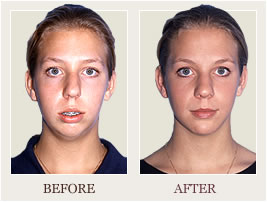Enjoy the Benefits of Corrective Jaw Surgery

Orthognathic surgery moves your teeth and jaws into positions that are more balanced, functional and healthy. Although the goal of orthognathic surgery is to improve your bite and function, many patients also experience enhancements to their appearance, breathing and speech. The results of orthognathic surgery can have a dramatic and positive effect on many aspects of your life, and it’s likely that your self-esteem and confidence will be significantly boosted.
During Healing
Orthognathic surgery is a major operation, and it’s important that you are informed of some risks.
- Blood loss during jaw surgery is typically modest, and bleeding that requires a transfusion is extremely rare. Immediately following surgery, particularly of the upper jaw, minor bleeding from the nose may occur. Although excessive or prolonged bleeding after surgery is uncommon, if it occurs it may prompt further care by your surgeon.
- The nerves that supply sensation or feeling to the jaws are exposed during orthognathic surgery, and even though some temporary numbness or tingling following surgery is typical, it diminishes as healing progresses. In very rare cases, the alteration of sensation may be permanent.
- During surgery, the position of the jaws and the bite are set when the patient is lying down. At this time the jaw muscles are completely relaxed under general anesthesia. When the patient is awake and upright, jaw muscle tone is regained and the bite is subtly different. After surgery, Dr. Joseph carefully follows each patient’s progress to ensure the new bite is identical to the original plan. Orthodontic rubber bands are often used during this time to guide the development of the bite. In rare cases, if the bite is not exactly as projected, additional surgery may be necessary.
- Infection, while a potential risk following any surgical procedure, is very rare and is usually treated with antibiotics.
- Inadvertent injuries to teeth, roots, fillings, bridgework or surrounding tissues may occur during any surgical procedure in the mouth. If they occur, they may require appropriate correction.
- Healing from surgery and adjusting to the new position of your jaws may result in some temporary limited jaw movement and/or chewing or speaking difficulty. These symptoms will improve as healing progresses. In some instances, special jaw exercises are prescribed to help you become adjusted to your new jaw position and bite.
- Any procedures, such as dental treatment, orthognathic surgery or orthodontics, that change the position of the teeth may aggravate or result in TMJ (Jaw Joint) problems. While orthognathic surgery is frequently performed to improve TMJ functions and symptoms, in rare cases, it may exacerbate a pre-existing condition.
Patients are able to return to work or school one to three weeks after surgery. Although the initial phase of healing is about 6 weeks, complete healing of the jaws takes nine to 12 months. After surgery, Dr. Joseph decides when your orthodontist may begin "fine-tuning" your bite, which usually takes about six months. Your orthodontist determines when your treatment is complete.

